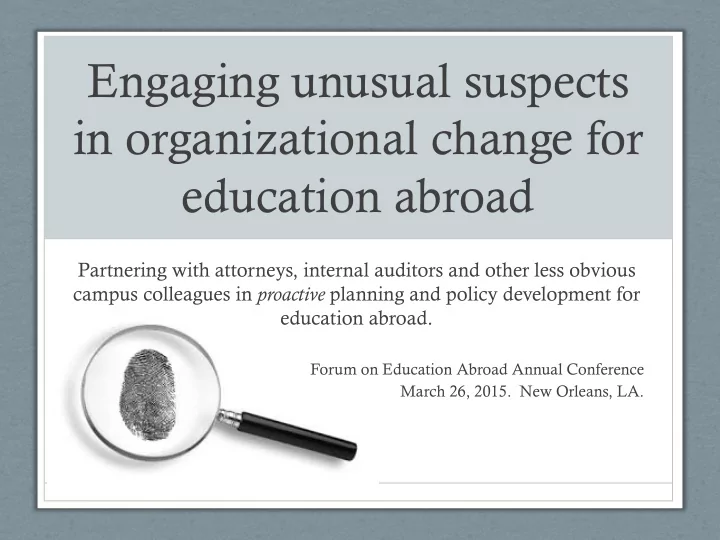

Engaging unusual suspects in organizational change for education abroad Partnering with attorneys, internal auditors and other less obvious campus colleagues in proactive planning and policy development for education abroad. Forum on Education Abroad Annual Conference March 26, 2015. New Orleans, LA.
Guiding Questions • How can we better align education abroad goals, planning and business needs with other campus operations? • Who are some less visible contributors to these efforts? • What are some concrete mechanisms for building collaboration among these stakeholders?
Organizational Context The university as an organized anarchy : • Legitimate and stand the test of time • Effective and inefficient • Messy, multiple and conflicting goals • Impose order through shared meanings and assumptions • “Garbage can” model of decision making Manning, K. (2013.) Organizational theory in higher education . New York: Routledge.
Education Abroad Capacity Building • Expanding numbers of students with international experience • Enhancing the health and safety of our travelers • Streamlining administrative processes to help our professionals “do more with less” • Sharing information and reducing duplication of effort • Securing resources (financial and human) needed to support education abroad
Organizational Change for Education Abroad Capacity Building Drivers: Outcomes: Our students 1. Institutionalizing policies Our faculty 2. Developing business processes International education professionals 3. Building collaborative networks Reaccreditation quality initiative on 4. Fostering shared ownership internationalization in multiple roles / levels Internal audits
Our U-M Suspects • Amy Conger (facilitator), Assistant Vice Provost for Global and Engaged Education • Lorraine Currie, Senior Manager of University Audits • Donica Varner, Associate General Counsel • Sandra Wiley, Director of International Programs in the Stamps School of Art & Design, Chair of the Council on Global Engagement -University of Michigan, Ann Arbor
Panel Discussion
Q&A • How can we better align education abroad goals, planning and business needs with other campus operations? • Who are some less visible contributors to these efforts? • What are some concrete mechanisms for building collaboration among these stakeholders?
Lessons Learned 1. Collaborate on proactive outcomes. So how do we know when we’re there? 2. Seek out other unusual suspects. Who’s not at this table? 3. Change is ongoing. What’s next?
So how do we know when we’re there? • New policies are institutionalized: Standard Practice Guide for international travel, campus-wide travel abroad insurance, standard agreements and student forms. • Business processes are developed and become part of daily routines: Travel registration, M-Compass system for education abroad, standard legal agreements and student forms. • Collaborative networks are formalized: Council on Global Engagement, M-Compass Users Group, International Education Network, International Travel Oversight Committee. • Shared ownership of education abroad is established at multiple levels and across multiple roles: Education abroad is not just the business of international programs offices. It takes a village!
Who’s not at this table? • Communication and News Services • Development • Financial Aid • Information Technology Services • Registrar’s Office • Procurement Services
What next? • Campus-wide pre-departure preparation for students (remember our ~30 education abroad offices offering programs!) • More rigorous screening and training for faculty leaders • Stronger re-entry programming for students • Enhanced risk management and support for student-driven, co-curricular education abroad
Recommend
More recommend